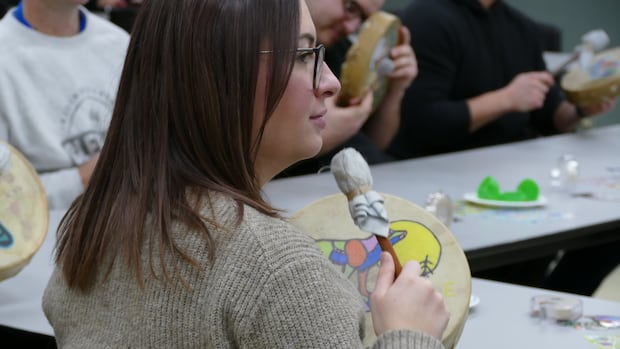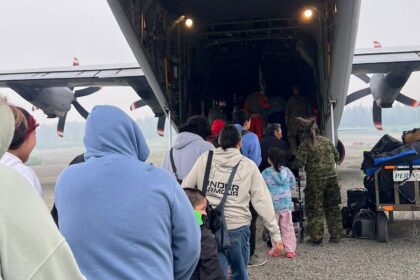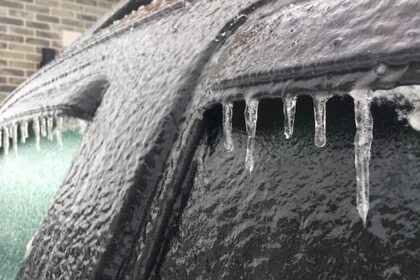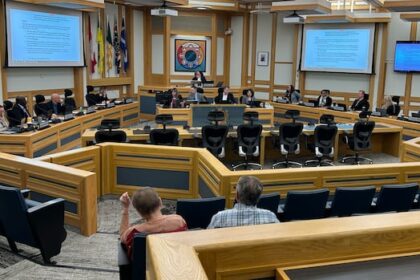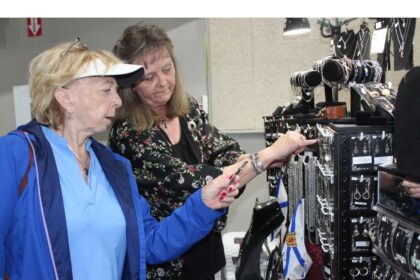ManitobaTeachers in the Lord Selkirk School Division learned how to bring truth and reconciliation concepts into the classroom through knowledge keepers and professional development workshops.Professional development day includes drumming, beading in SelkirkJura McIlraith · CBC News · Posted: Nov 21, 2025 5:47 PM EST | Last Updated: 12 hours agoListen to this articleEstimated 4 minutesThe audio version of this article is generated by text-to-speech, a technology based on artificial intelligence.Katrine Buissé, a teacher at Selkirk Junior High School, takes part in a professional development day focused on Indigenous teachings. (Gala Dionne)A group of Manitoba teachers is learning how to include truth and reconciliation concepts in their classrooms beyond the official curriculum.Educators in the province’s Lord Selkirk School Division attended a professional development day Friday that included teachings on drumming and beading from Indigenous knowledge keepers.Kat Marsch said after the province announced a plan to have all teachers and school staff get treaty training by the end of the year, many at Selkirk Junior High School wanted to know how to connect with knowledge keepers in a good way. The Métis vice-principal says it can be difficult to know where to begin, and some teachers are unsure how to reach out to knowledge keepers in a culturally appropriate way.”Today gives them an opportunity to be able to connect to people in a really safe space where they can ask questions,” Marsch said. “They can, you know, navigate how to do this kind of work as a teacher, especially for those teachers who are maybe non-Indigenous and how that might be a bit daunting to some of them.”Indigenous knowledge keepers Jacqueline Bercier and Marlena Muir take part in educating teachers during a professional development day at Selkirk Junior High School. (Gala Dionne/CBC)Staff questions included whether they can touch Indigenous drums or wear ribbon skirts if they’re not Indigenous.”We want teachers to be able to kind of get over some of those fears so that they do feel more comfortable having these perspectives brought into their classrooms,” Marsch said.The teachers are working in the community where former senator and chair of the Truth and Reconciliation Commission Murray Sinclair grew up and went to school.Marsch remembers Sinclair saying “education is what got us into this mess, and education is key to getting us out of it.” Although Sinclair died just over a year ago, his spirit still lives on through sessions like these, she said.”I hope they walk away today feeling more confident in their ability to bring Indigenous programming into the classroom, whether they are, you know, born and raised in Selkirk, whether they’re Indigenous or non-Indigenous, whether they’re a newcomer, a francophone teacher or an English-speaking teacher, a shops teacher or a band teacher,” Marsch said.Inuit cultural carrier Katie May Anawak-Dunford says it’s exciting to be able to teach her knowledge and skills to Manitoban educators. (Gala Dionne/CBC)Inuit cultural carrier Katie May Anawak-Dunford said it’s important to also include knowledge about communities outside of Manitoba.Being a part of educating teachers through workshops is exciting, she said.”When we’re in the provinces down here, we often unintentionally leave out Inuit perspectives just because Inuit are not as common here,” Anawak-Dunford said. “But I do think bringing in that perspective is important, because there are urban Inuit.”Denis Gringras, who teaches math and science in French immersion, said it’s all about understanding each other.”It just makes you a little more aware of why certain issues may exist and how you can at least become knowledgeable, so that we’re all growing together,” Gringras said.The Truth and Reconciliation Commission’s recommendations include developing curriculum on the history of residential schools, offering culturally appropriate teacher training through Indigenous communities and giving students opportunities to learn from survivors.Yvonne Poitras Pratt, a professor at the Werklund School of Education at the University of Calgary, said there’s still a lot of work to be done.There are many roadblocks that go well beyond the curriculum, Poitras Pratt said. Some of her student teachers are fearful parents will have strong negative reactions to the teaching of Indigenous perspectives.”We haven’t made enough strides. I really feel like we’re still, sadly, at the point of still trying to get people to move from awareness,” Poitras Pratt said. “There are those glimmers of hope when people say, ‘I want to learn more. I just learned about this.'”Once you know better, you can do better, she said, and it’s important for everyone to reflect on ways they can move forward on the TRC’s calls to action.WATCH | Manitoba teachers, education students get lessons in reconciliation:Manitoba teachers, education students get lessons in reconciliationA group of teachers from the Lord Selkirk School Division and student teachers from the University of Manitoba attended a session Friday on how to integrate truth and reconciliation concepts into their regular teaching beyond the official curriculum.ABOUT THE AUTHORJura McIlraith is a CBC Manitoba reporter based in Steinbach. She started her journalism career covering stories in the southeast for The Carillon. Since then, she has worked for multiple print publications including the Winnipeg Free Press and in radio for 680 CJOB. You can reach her at jura.mcilraith@cbc.ca.With files from Karen Pauls and Kory Siegers
Wednesday, 4 Mar 2026
Canada – The Illusion
Search
Have an existing account?
Sign In
© 2022 Foxiz News Network. Ruby Design Company. All Rights Reserved.
You May also Like
- More News:
- history
- Standing Bear Network
- John Gonzalez
- ᐊᔭᐦᑊ ayahp — It happened
- Creation
- Beneath the Water
- Olympic gold medal
- Jim Thorpe
- type O blood
- the bringer of life
- Raven
- Wás’agi
- NoiseCat
- 'Sugarcane'
- The rivers still sing
- ᑲᓂᐸᐏᐟ ᒪᐢᑿ
- ᐅᑳᐤ okâw — We remember
- ᐊᓂᓈᐯᐃᐧᐣ aninâpêwin — Truth
- This is what it means to be human.
- Nokoma


